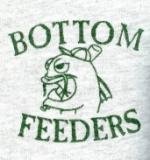The Senators' Final Game
By Shirley Povich Washington Post Columnist Oct. 1, 1971
Everybody in Kennedy Stadium stood up at 7:30 p.m. because the voice on the loudspeaker said, "We ask you to join Robert Merrill in singing the National Anthem." The voice did not bother to explain that Merrill was on wax, and that Robert, baby, was not deserting the Metropolitan Opera stage for this occasion. It was merely one more of management's deceptions Senators' fans had long been taught to live with.
To those among the crowd who had come in sorrow, the Star Spangled Banner never before sounded so much like a dirge. Francis Scott Key, if he had taken another peek by the dawn's early light, would have seen that the flag ain't still there, and lyricized accordingly. It was captured and in transit to Arlington, Tex., which, to embittered Washington fans, is some jerk town with the single boast it is equidistant from Dallas and Fort Worth.
But the jocularity of so many among the 14,460 fans who were present challenged any belief that they had come to a death-bed scene. The Washington Senators, at the end of this game, would be no more after 71 years on earth. The deceased, actually, was a pretty good draw, pulling those who had come to give a last cheer for remembered heroes, or, perforce, to wipe away some tears in public.
But for every mourner who made it to the ball park, there were multiple empty seats to testify that 30,000 others had averted their eyes from the scene, shunning it either in indifference to the whole business or in reluctance to give chortling Bob Short one last handout at the highest admission prices in the league.
Those who were savoring this last, fond look at the Senators let it be known by their cheers that they absolved the athletes of all blame in the messy machinations that rooked the city of its major-league status. Even the .190 hitters heard the hearty farewells, and in the case of big Frank Howard it was thunderous when he came to the plate.
If there was no general wet-eyed melancholia in the stadium, there were still unmistakable pockets of bitterness. From the upper stands hung banners spelling out four-letter words in large design, all of them reviling club owner Bob Short for shanghaing the team to Texas.
Special police dispatched by management to remove the hanging vulgarities in the second inning drew the boos of the crowd, which was making no secret that its sentiments were pro-banners and anti-police. And then in the third inning, the six-letter word made its appearance in the left-field upper stands in a new, vertical banner that read "Short Stinks." There were new cheers for that little number, which had a life of approximately 10 minutes before police took it by storm.
In the stands, neighbor nudged neighbor in glee while pointing to the sprouting number of anti-Short graffiti in the the stadium. But in the sixth inning, with one swipe of his bat, Frank Howard redirected all attention, back to the ball game. He did it with No. 26, one of his super jobs.
It brought on a crowd delirium that for the next many minutes effaced any sadness the people had brought to the stadium on the supposedly sorrowful night. Howard responded with emotion of his own, tipping his hat to a cheering crowd for the first time in his seven years with the Washington club. After whirling his vatting helmet in the air as he rounded the bases, he flipped his soft playing cap into the stands as a fifth symbol of his gladness.
It was four-run inning that tied the score for the Senators at 5-5, and in the eighth they went in front, 7-5, but now, oddly, the temper of the crowd was changing. As if in sudden awareness that the end of major-league baseball in Washington was only one inning way, the mood hardened. "We want Bob Short!" was the cry that picked up in loud and angry chorus, and it was the baying-fury sound of a lynch mob.
Then a swarm of young kids, squirts who wouldn't know what it had meant to have a big-league team all these years, or what it would mean to lose one, flooded onto the field from all points of the stands. A public address announcement warned that the home team could forfeit the game unless the field was cleared, and pretty soon the game resumed.
It got as far as two out in the ninth, the Senators' 7-5 lead intact, no Yankee on base, when one young rebel from the stands set off again. He grabbed first base and ran off with it. Some unbelievers, undaunted by the warning of forfeit, cheered, and from out of the stands poured hundreds, maybe a couple of thousand fans. They took over the infield, the outfield, grabbed off every base as a souvenir, tried to get the numbers and lights from the scoreboard or anything else removable, and by their numbers left police and the four umpires helpless to intervene.
The mad scene on the field, with the athletes of both teams taking refuge in their dugouts, brought official announcement of Yankees 9, Senators 0, baseball's traditional forfeit count almost since Abner Doubleday notched the first baseball score on the handiest twig at Cooperstown. But by then the crowd-mood was philosophical, "So what?"
Or more accurately, "So whatha hell?" The Senators were finished, even if the ball game wasn't.
© Copyright 1971 The Washington Post Company







No comments:
Post a Comment